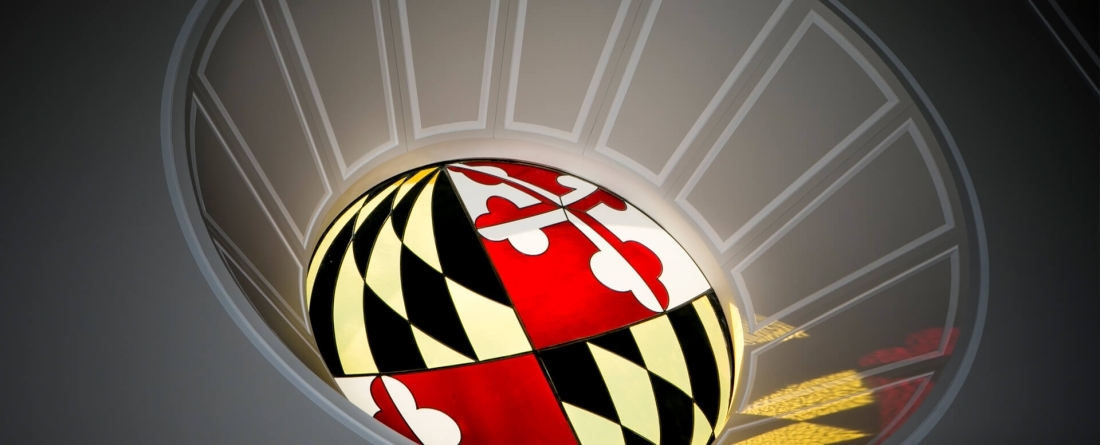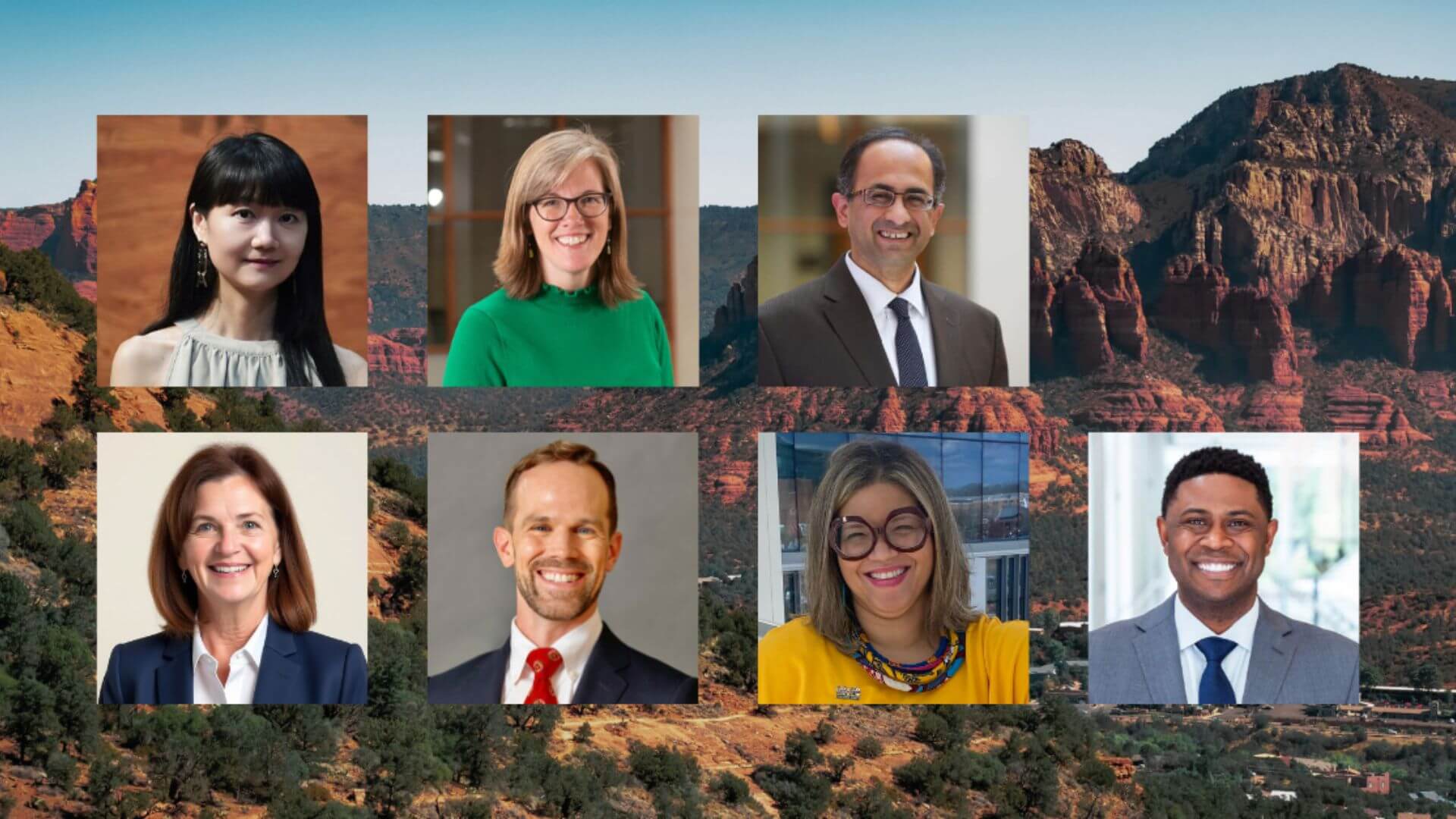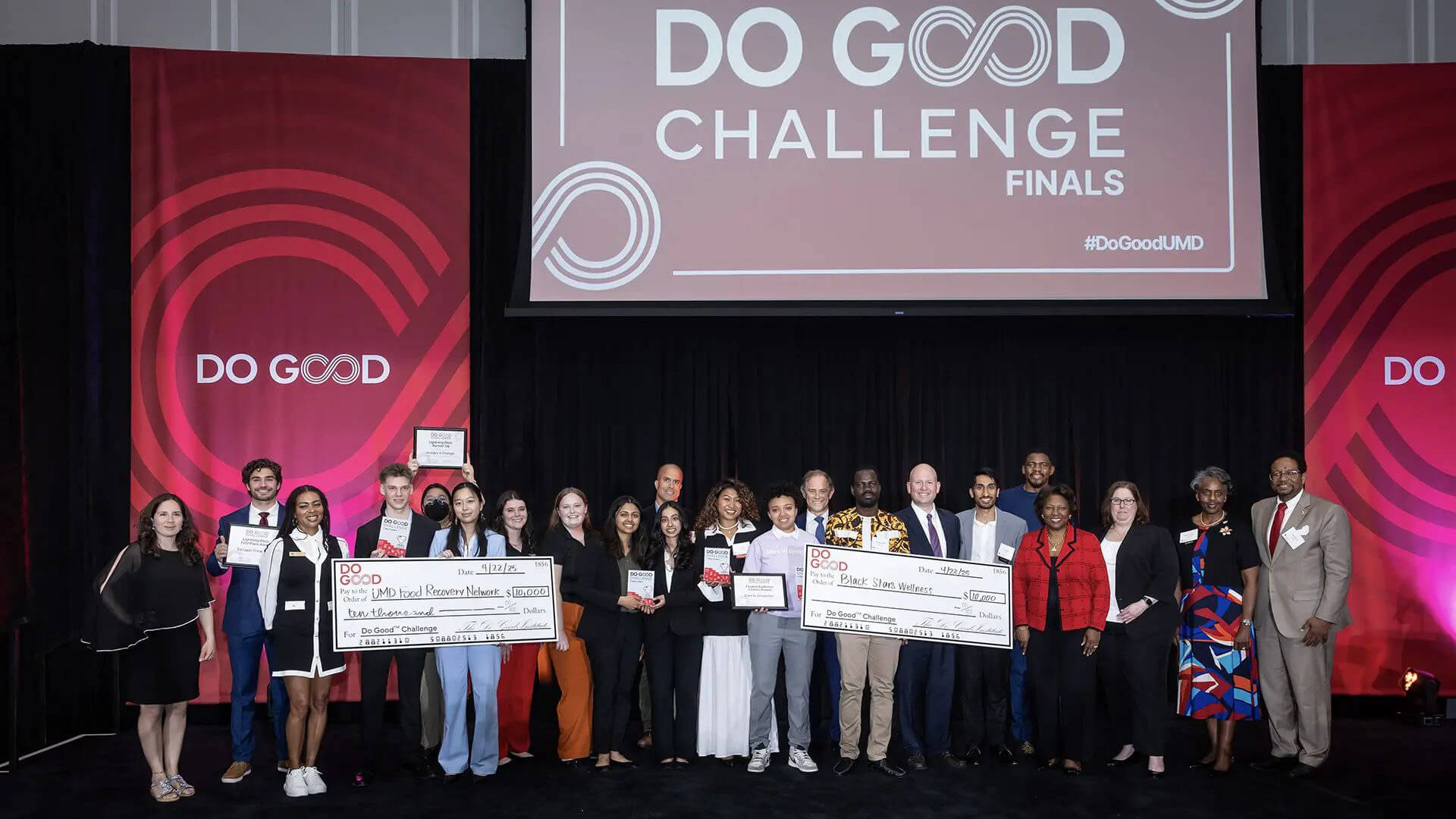
The Do Good Institute is excited to announce the selection of the 2018 Do Good Challenge semi-finalists. These teams will compete for the opportunity to advance to the Do Good Challenge Finals where they have the opportunity to win a share of more than $20,000 and present in front of a panel of expert judges and an audience of hundreds.
A total of 17 teams were selected as semi-finalists, from more than 100 registered teams. Teams are addressing social issues ranging from environmental sustainability to food insecurity to the world refugee crisis. Teams are led by students representing College of Agriculture and Natural Resources; College of Arts and Humanities; College of Computer, Mathematical and Natural Sciences; James Clark School of Engineering; Individual Studies Program; Letters and Sciences; Philip Merrill College of Journalism; School of Education; School of Public Health; School of Public Policy; and Robert H. Smith School of Business. In addition, students are involved in programs across campus including, Beyond the Classroom; College Park Scholars; Entrepreneurship and Innovation Program; CIVICUS, Global Public Health Scholars; Honors College; and QUEST Honors Program.
2018 Projects
Camp Kesem at University of Maryland aims to support children whose parents have cancer through and beyond their parent’s cancer treatment. The group is planning to host a week-long summer camp for children and create a community of individuals that can relate to each other about the struggles they are going through when dealing with cancer in their families. Camp Kesem has already registered nearly 30 campers for this summer and raised over $21,ooo for camp activities. By offering innovative, fun-filled programs that foster a lasting community, Camp Kesem at University of Maryland aims to ensure that every child impacted by a parent’s cancer is never alone.
- Alexander Tran, Robert H. Smith School of Business, College Park Scholars (Environment, Technology, and Economy), QUEST Honors Program
- Kaylee Helmbacher, College of Computer, Mathematical and Natural Sciences
- Logan Dechter, Letters and Sciences
- Devin Cain, James Clark School of Engineering, College Park Scholars (Public Leadership)
- Gillian Vesely, Philip Merrill College of Journalism
Nourish: Mommy and Me is a student organization that aims to support pregnant women and their children and provide them with healthy foods to sustain them throughout their pregnancy. Nourish partners with Gabriel Network, a nonprofit organization that helps mothers in crisis pregnancies in Prince George’s County and Howard County. Nourish provides the mothers residing in Gabriel Network’s maternity home boxes with reliable, nutritious, and delicious food each week. This year, the team has already provided 156 boxes through 15 delivery days and plans to deliver an additional 75 by the end of the semester.
- Sarah Dudley, School of Public Policy, Beyond the Classroom
- Samantha Kennedy, School of Public Health
Preventing Sexual Assault (PSA) aims to prevent sexual assault at the University of Maryland through education, awareness, and advocacy for survivors and aims to improve the university’s reporting process. Throughout the year, PSA hosts various events, fundraising activities, and awareness campaigns, which culminate in a 12-hour Occupy McKeldin event, that focuses on educating students, promoting advocacy, as well as providing survivors an outlet to heal amongst the support of the campus community.
- Cristina Johnson, Philip Merrill College of Journalism, Honors College
- Kimberly Johnson, Robert H. Smith School of Business, Honors College
- Nikki Wolfrey, School of Public Policy, Individual Studies Program
- Alex Wilson, School of Public Health
Public Health Without Borders aims to provide sustainable health education in local communities in India, Peru, and Sierra Lone. The projects focus on first aid, nutrition, prevention of infectious diseases, oral hygiene, hand washing, and oral rehydration therapy for diarrheal diseases. The group will travel on its fourth visit in June 2018 to a community in Sierra Lone to teach students, parents and adults in the local community about oral hygiene, nutrition and water safety through workshops and health education demonstrations. In addition, a needs assessment will be conducted to identify additional priority health concerns among community members, as well as assess past interventions. This year Public Health Without Borders has raised nearly $12,000 for materials and travel costs.
- Kathleen Lindsey, School of Public Health
- Maddy Pekosz, School of Public Health, College Park Scholars (Global Public Health)
- Veeraj Shah, James Clark School of Engineering
- June Solow, School of Public Health
- Kelsey Talarico, College of Computer, Mathematical and Natural Sciences
ROOTS Africa is an organization aiming to provide solutions to agricultural problems faced by developing countries through partnerships with local farmers and civil society organizations. ROOTS is currently partnering with Liberian International Christian College (LICC) in Ganta, Liberia and traveled to Liberia in March to help address agricultural challenges faced by local farmers. ROOTS held village farmer trainings and held an agricultural business development workshop for 160 farmers, reaching over 200 farmers with agricultural training in total. ROOTS raised over $20,000 to cover travel and materials, including over 160 books to start an agricultural section in the LICC library.
- Nebafabs Cedric Nwafor, College of Agriculture and Natural Resources
- Leyla Merlo, School of Public Health
- Dylan Fishbein, College of Agriculture and Natural Resources
- Mandela Jones, College of Agriculture and Natural Resources
- Brian Glenn, College Agriculture Resource and Economics
- Khusbu Patel, School of Public Health
Science Enrichment After School inspires interest and curiosity in science among local elementary schoolers. The group teaches 4th and 5th graders about science twice a week through fun, interactive activities and experiments. These science lessons supplement the students' in-class scientific education. Additionally, students have the opportunities to form meaningful mentoring relationships with the volunteers. Last fall the organization logged 170 volunteer hours with 40 volunteers.
-
Kurt Auville, College of Computer, Mathematical and Natural Sciences
Scholars Promoting and Revitalizing Care (SPARC) seeks to address gaps in mental health resources at the University of Maryland by advocating for increased accessibility, funding, and staffing for campus mental health facilities. The team also works to raise awareness about existing resources on campus and encourages students to prioritize and dialogue about mental health. SPARC sent an awareness letter to 1,200 UMD employees and administrators, distributed over 5,000 resource cards and flyers, and held other events and dialogues with students and administrators, including the university President. SPARC's social media efforts reached over 50,000 individuals. SPARC’s work was acknowledged by the President and led to the hiring of 3 new additional full-time staff psychologists at UMD.
- Anthony Sartori, College of Behavioral and Social Sciences
- Roxy Kazem, Robert H. Smith School of Business, College Park Scholars (Public Leadership)
- Kirsten Brockett, Individual Studies Program
- Sreya Gunna, Individual Studies Program, CIVICUS
- Ferddy Gedeon, Individual Studies Program, College Park Scholars (Science Discovery and the University)
- Alyssa Schledwitz, College of Computer, Mathematical and Natural Sciences, College Park Scholars (Life Sciences)
Students for the Advancement of Women in Science aims to provide under-privileged middle school girls with the opportunity to explore scientific concepts outside of the classroom in places they would not be able to see otherwise. SAWS currently provides an after-school program for around 25 middle schoolers in PG County at Charles Carroll Middle School, where 74% of the students live below the poverty line. According to Charles Carroll, SAWS has the highest retention rate of any after-school program at the school. This semester, students were also provided a fully funded trip to the Smithsonian Air and Space Museum to learn more about space and aerodynamics. SAWS' 25 volunteers have logged 200 volunteer hours, and the organization has raised over $2,000.
- Natalia Ochman, James Clark School of Engineering, Honors College (Integrated Life Sciences)
Terp Thon, the largest student-run philanthropic organization at the University of Maryland, raises funds and awareness For The Kids at Children’s National Health System. Throughout the year, Terp Thon hosts various events, fundraising activities, and awareness campaigns, which culminate in a 12-hour Dance Marathon each March where students stand in support of current and former patient families of Children’s Miracle Network Hospitals. All of the funds raised provide patients and families with top-notch medical care and array of support programs transforming their experience at the hospital. This year 2,600 individuals participated in the Dance Marathon and Terp Thon raised over $734,000 to support patients at Children's National.
- Amara Fox, School of Public Health, College Park Scholars (Global Public Health)
- Kate Burgess, School of Education
- Elizabeth McKinley, School of Education
- Brenna Hohl, James Clark School of Engineering, University Honors
- Kelly Stipa, Robert H. Smith School of Business and College of Arts and Humanities, University Honors
2018 Ventures
Algal Turf Scrubber (ATS) – American Ecological Engineering Society plans to be the first ecological engineered technology implemented on University of Maryland’s campus to filter out storm water runoff pollutants and provide hands on research experience. Algae, the byproduct of ATS, can be collected and repurposed (e.g. algae fertilizer and algae concrete). The first ATS will be installed in front of the Terrapin Trail Garage bioretention pond by XFINITY Center at University of Maryland, College Park. The team submitted a proposal to the 2017 EPA Rainworks competition and is also currently building a smaller 1x5 meter pilot ATS system.
- William "Jacob" Mast, College of Agriculture and Natural Resources
- Annabelle Arnold, College of Agriculture and Natural Resources, College Park Scholars (Environment, Technology and Economy)
- Emily Goo, College of Agriculture and Natural Resources
- Samantha Francis, College of Agriculture and Natural Resources
- Miriam Tasker, College of Agriculture and Natural Resources
- Matthew Lagomarsino, College of Agriculture and Natural Resources
Flush X aims to redefine the way automatic toilet flushing works. Flush X plans to reduce the water consumption of the University of Maryland by 15 percent by installing a new toilet flush sensing mechanism that eliminates empty flushes. The invention is an augmented version of the traditional stall door slider that includes a contact sensor and signal emitter capable of detecting when a stall lock is unlocked. Once the action of the stall door unlocking is detected, the signal emitter then sends a message to the toilet, causing it to flush. The group plans to complete its prototype by May 2018 and pilot the device at Adele H. Stamp Student Union and the Clarice Performing Arts Center at University of Maryland. The team has also secured over $2,000 in grants to fund its prototype development.
- Charles Grody, James Clark School of Engineering, QUEST and Honors College (Entrepreneurship and Innovation)
- Ryan Howard, James Clark School of Engineering, Honors College (Entrepreneurship and Innovation)
- Casey McCarthy, Robert H. Smith School of Business, Honors College (Entrepreneurship and Innovation)
- Rolane Qian, James Clark School of Engineering, Honors College (Entrepreneurship and Innovation)
Noble Uprising aims to empower homeless women in shelters, by providing them with career readiness workshops and sustainable job opportunities. Nobel Uprising works with local shelters in Montgomery County and utilizes them as channels to connect with the homeless women. Nobel Uprising has already launched a pilot program, the One Heart Project, which partnered with the Walmart Women's Empowerment Program to provide the women at Montgomery Avenue Women's shelter with career development workshops. This year Noble Uprising registered as a nonprofit organization and launched the WeCare program, which provided care packages and handwritten cards to over 60 women experiencing homelessness. Noble Uprising is also planning its summer Noble Up program that provides homeless women with career development workshops and seminars, and has already secured one corporate and five community partnerships.
- Lumnwi Audrey Awasom, Robert H. Smith School of Business
- Monia Bonkoungou, School of Public Health
Recyclify is developing a phone application and smart bin to increase recycling rates at the University of Maryland. Currently, 54 percent of recycling bins at the STAMP Student Union are contaminated with materials that are non-recyclable. Because of the high rate of contamination, these bags are sent to the landfill. Recyclify aims to educate and incentivize students through the app with a “Green Score” that provides redeemable points at STAMP food court locations. Recyclify has already been awarded a $1,500 Earth Mini-Grant from the Office of Sustainability and will be working closely with Dining Services and Facilities Management to develop their prototype. Recyclify implemented bi-weekly recycling bin audits in the fall and spring semesters, logging over 100 pilot hours. In the spring pilot they have consistently hit their target of a 90% recycling rate, with the best audit achieving a 95% recycling rate/5% contamination rate. Recyclify plans to continue piloting the rest of the semester and increasing its vendor sponsorships.
- Ardalan Djourabtchi, Robert H. Smith School of Business
- Christopher Langreo, College of Computer, Mathematical and Natural Sciences
- Jason Malkofsky-Berger, Robert H. Smith School of Business
Symbiont Health is working to accelerate the response and rescue of the elderly who lose consciousness and fall through an enhanced medical alert system. This organization’s device and alert system detects falls through motion sensor and gyroscopic technology. It is looking to expand its services by implementing a mesh networking system for WiFi routers to better track patient behaviors and real-time, vital diagnostic information. The group has a prototype and plans to test the router hardware in three homes—Sunrise, Brightview, and Manorcare—this summer. Symbiont has been conducting extensive stakeholder research through its customer discovery campaign and has interviewed over 50 stakeholders during the Challenge and received over 1,000 survey responses. Symbiont has raised $20,000 this year.
- Erich Meissner, James Clark School of Engineering, Honors College (Entrepreneurship and Innovation)
- Kyle Liu, College of Computer, Mathematical and Natural Sciences, University Honors
- Maria Chen, College of Computer, Mathematical and Natural Sciences, Honors College (Integrated Life Sciences)
Synapto is an early stage biotech company revolutionizing Alzheimer's diagnosis through portable EEG and Machine Learning. Currently, Alzheimer's is the sixth leading cause of death in the United States, affecting nearly 44 million people worldwide. According to the 2016 World Alzheimer Report, 20 to 50% of patients were not properly diagnosed in middle to high income countries, and due to lack of medical infrastructure and access to care, less than 10% were diagnosed in low-income countries. Their innovative device moves away from costly neuroimaging diagnostic techniques and qualitative methods of diagnosis to a more robust, affordable, and objective measure of analysis, a portable Electroencephalogram (EEG). They are currently seeking FDA approval (under the 510(k) Class 2 Medical Device Pathway) to continue their work. Synapto has already won 1st place in National Institute of Health’s DEBUT competition and has been featured in more than 27 news outlets including Forbes, Science Magazine, and Washingtonian. This year they secured approximately $25,000 in funding.
- Dhruv Patel, James Clark School of Engineering, College Park Scholars
- Christopher Look, College of Computer, Mathematical and Natural Sciences, James Clark School of Engineering, Honors College (Entrepreneurship and Innovation)
- Anoop Patel, College of Computer, Mathematical and Natural Sciences, James Clark School of Engineering, Honors College (Design Cultures & Creativity)
- David Boegner, James Clark School of Engineering
- Megha Guggari, College of Computer, Mathematical and Natural Sciences, Honors College (Integrated Life Sciences)
The Motion Project is a nonprofit that seeks to give children with physical disabilities the same opportunities as children without by using social welfare to help keep students in school and combat the cultural discrimination of people with movement restrictions. After partnering with the Colombo Friend-in-Need Society, a NGO prosthesis and orthotic clinic located in Sri Lanka, The Motion Project began sponsoring educational grants for students who received treatment at the center. This year The Motion Project supported 200 educational grants totaling $800. In addition, the organization is exploring the possibility of introducing 3-D printing for prosthetic devices into its partner clinic because wait-lines for government-provided prosthetics can range from months to years. The Motion Project will partner with Sri Lankan Student Association (SLSA) to host an on-campus fundraiser and art sale at the end of April.
- Donald De Alwis, College of Agriculture and Natural Resources, School of Public Health, Honors College (Integrated Life Sciences)
Tommy WARES is an ethical apparel company that works with independent artists to fund social impact investment projects. Tommy WARES provides ethically made shirts as a revenue stream for nonprofit organizations to raise money to further their operations at no up-front cost. This year Tommy WARES sold 60 shirts and generated over $2,000 in sales. In addition, the organization planted 102 trees through donations to the One Tree Planted organization.
- Tommy Piantone, Robert H. Smith School of Business
- Max Skoglund, College of Agriculture and Natural Resources



